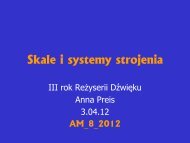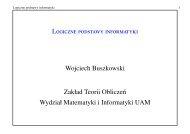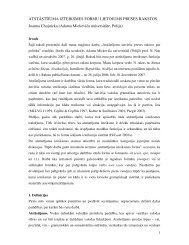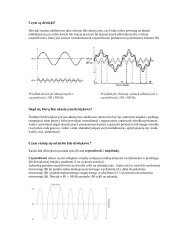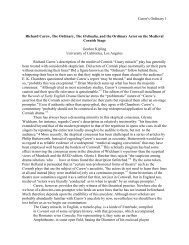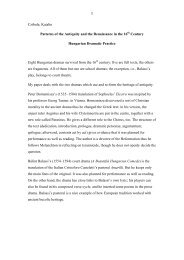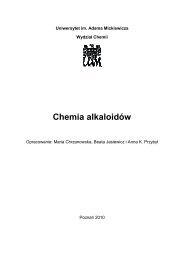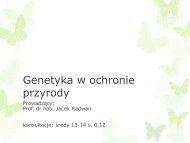Amir Weiner Getting to Know You
Amir Weiner Getting to Know You
Amir Weiner Getting to Know You
Create successful ePaper yourself
Turn your PDF publications into a flip-book with our unique Google optimized e-Paper software.
GETTING TO KNOW YOU 25<br />
If these measures seemed overwhelming, this was certainly not the view<br />
from Moscow. Pressure <strong>to</strong> expand the information gathering was constant<br />
and relentless. In December 1948, the minister for state security of the<br />
Es<strong>to</strong>nian Republic was repri man ded for sloppy recording of the “nationalist<br />
element.” As Moscow saw it, the existing records failed <strong>to</strong> reflect the actual<br />
situation, resulting in inadequate measures in the fight against the nationalist<br />
underground and its supporters. Hence a complementary card index was<br />
created, drawing data from official bulletins of Soviet and party organs,<br />
citizens’ communica tions, confiscated documents of nationalist activists, and<br />
confessions of detainees. Similar ly, it was decreed that suspects’ relatives had<br />
<strong>to</strong> be registered as well, resulting in the by then already established pattern<br />
of mass deportations in which actual anti-Soviet activists were a minority<br />
among their relatives and supporters, who accompanied them <strong>to</strong> the special<br />
settlements. 69<br />
The importance attached <strong>to</strong> information gathering was underscored in<br />
the course of postwar civil war in the western borderlands. Captured armed<br />
guerrillas who otherwise would have been shot on the spot were often offered<br />
the opportunity <strong>to</strong> “a<strong>to</strong>ne for their crimes against the motherland” by returning<br />
<strong>to</strong> the guerrillas as Soviet informants. Just in case, they signed a statement<br />
that should they stray again, their families would pay for their recidivism with<br />
exile. 70 Nikita Khrushchev, who presided over the struggle against Ukrainian<br />
nationalist guerrillas, repeatedly emphasized that surveillance and meticulous<br />
registration of the population were the key <strong>to</strong> success. “We have <strong>to</strong> think<br />
carefully about each district, mobilize forces and improve surveillance so we<br />
can catch the bandits and clear the way,” Khrushchev <strong>to</strong>ld party and security<br />
officials in western Ukraine. Seasoned police and party personnel should<br />
repeatedly go <strong>to</strong> the village and verify suspect lists, he said, and went on <strong>to</strong><br />
remind his audience that “initially, the OUN [Organization of Ukrainian<br />
Nationalists] operated legally under the Germans. We should find the lists<br />
they were using. That’s why we have the Cheka… . I suggest that we draw<br />
information lists on the gangs in the districts, villages, and regions. These<br />
lists should indicate not only the number of bandits but also name the gangs’<br />
commanders.” 71<br />
69 ERAF SM f. 131, n. 1, s. 151, ll. 38–39. For the composition of one wave of deportations<br />
in March 1949 by gender, age, family relations, and contacts with those arrested, see Aigi Rahi,<br />
1949. aasta märtsiküüditamine Tartu linnas ja maakonnas (Tartu: Kleio, 1998), 65–70.<br />
70 TsDAHOU f. 1, op. 23, spr. 3286, ark. 57–59.<br />
71 N. G. Tomilina, ed., Nikita Khrushchev: Dva tsveta vremeni. Dokumenty iz lichnogo fonda, 2<br />
vols. (Moscow: Mezhdunarodnyi fond “Demokratiia,” 2009), 1:109, 114, 125.



